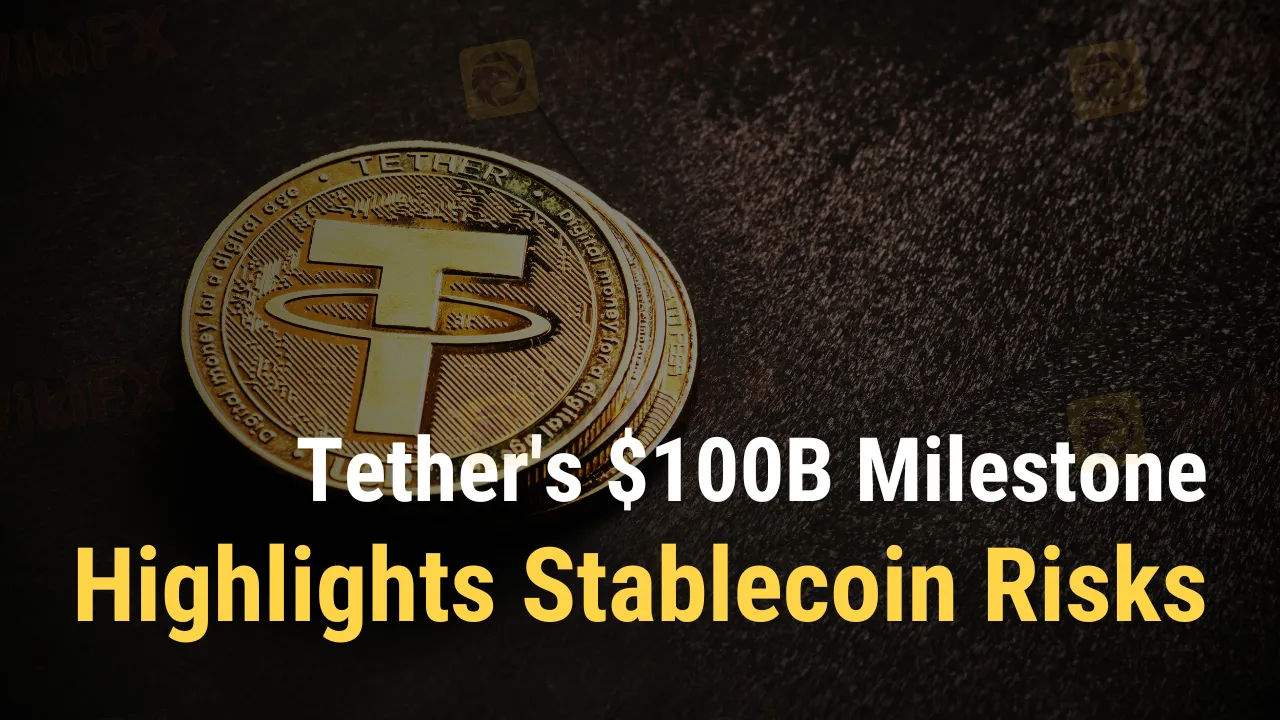简体中文
繁體中文
English
Pусский
日本語
ภาษาไทย
Tiếng Việt
Bahasa Indonesia
Español
हिन्दी
Filippiiniläinen
Français
Deutsch
Português
Türkçe
한국어
العربية
Tether's $100B Milestone Highlights Stablecoin Risks
Abstract:Tether reaches $100 billion, sparking stability concerns in the financial market. This largest stablecoin links to conventional currency, aiding swift crypto transfers.

Tether, the biggest stablecoin, reached $100 billion this week. This astonishing achievement raises worries about digital money's financial market risks. Tether is a stablecoin connected to a conventional currency. Tether says it backs each cryptocurrency with dollar-denominated assets for stability. Crypto traders use Tether to transfer money between trading platforms quickly and without utilizing the banking system.
Michael Hall, a founding partner of Nickel Digital, a crypto asset management company located in London, attributes Tether's smooth money transfers across trading platforms to the company's day-to-day operations. Stablecoins are helpful in the cryptocurrency market, but authorities worry about their financial system vulnerabilities. They see these digital currencies as a link between crypto and conventional finance, putting the latter in danger.
Tether's dominance poses a systemic danger, says CoinShares Head of Research James Butterfill. Though improbable, a Tether breakdown might impact crypto trading volumes. U.S. authorities have warned banks that stablecoin reserves may rapidly deplete if users change their tokens into fiat cash.
Tether's spokesman underlines the product's usefulness in offering financial system access to the unbanked worldwide. They noted Tether's aggressive collaboration with law enforcement and regulatory bodies globally to avoid stablecoin abuse, highlighting the freezing of millions in USDT tied to criminal activity. Tether CEO Paolo Ardoino pledged openness and financial responsibility earlier this year.

The bitcoin market is recovering from 2022 losses. Bitcoin achieved record highs last week, rising roughly 20%. U.S. spot bitcoin ETF inflows are responsible for this market recovery. With these market trends, Tether made $29 billion last year.
However, Tether's financial system's influence remains a worry. Given Tether's substantial reserve holdings in conventional banking, Moody's Investors Service's Rajeev Bamra warns of the possible consequences for banks. Concerns exist about Tether's market dominance and risk concentration.
Last year, S&P Global Ratings rated Tether's stability poor owing to its opaque reserve management. A 2021 deal with the New York Attorney General requires Tether to provide quarterly reserve reports. The current report shows U.S. Treasury securities, precious metals, bitcoin, other assets, and secured loans in reserves. Ernst & Young's Paul Brody says these studies are not financial audits.
Stablecoin regulation is changing as countries develop laws. S&P Global Ratings analyst Rebecca Mun remarked that Tether lacks reserve investment regulations.
The Hong Kong-based, British Virgin Islands-owned Tether Holdings Ltd. touts complete openness on its website. However, it does not specify reserve places. This lack of transparency and stablecoin dangers lead individuals like Hall to use Tether cautiously, comparing its convenience against the risk of losing its dollar peg.
Despite these worries, crypto traders prefer Tether. Its ability to retain its peg and manage significant redemptions amid market volatility like 2022 inspires confidence. Hall accepts the hazards of the turbulent crypto sector but calls Tether a safer digital asset.
In conclusion, Tether's $100 billion circulation milestone has raised concerns about its stability and financial sector influence. Traders and regulators will continue to focus on stablecoins like Tether as the crypto market recovers.

Disclaimer:
The views in this article only represent the author's personal views, and do not constitute investment advice on this platform. This platform does not guarantee the accuracy, completeness and timeliness of the information in the article, and will not be liable for any loss caused by the use of or reliance on the information in the article.
Read more

Why More People Are Trading Online Today?
Discover why online trading is booming with tech, AI, and a push for financial freedom. From stocks to crypto, it’s a thrilling hustle for all.

SEC Ends Crypto.com Probe, No Action Taken by Regulator
The SEC has closed its investigation into Crypto.com with no action taken. Crypto.com celebrates regulatory clarity and renewed momentum for the crypto industry.

Interactive Brokers Expands Crypto Trading with Solana, XRP, Cardano, and Dogecoin
Interactive Brokers adds Solana, XRP, Cardano, and Dogecoin to its platform, enabling U.S. and U.K. clients to trade crypto 24/7 with low fees.

Fidelity Investments Explores Stablecoin Innovation in Digital Assets Sector
Fidelity Investments tests a stablecoin, joining major financial firms in the booming crypto sector. Discover how this impacts digital payments and blockchain adoption.
WikiFX Broker
Latest News
Enlighten Securities Penalized $5 Million as SFC Uncovers Risk Control Failures
Why Are Financial Firms Adopting Stablecoins to Enhance Services and Stability?
Experienced Forex Traders Usually Do This Before Making a Lot of Money
Octa vs XM:Face-Off: A Detailed Comparison
When High Returns Go Wrong: How a Finance Manager Lost RM364,000
Bridging Trust, Exploring Best—WikiEXPO Hong Kong 2025 Wraps Up Spectacularly
Fidelity Investments Explores Stablecoin Innovation in Digital Assets Sector
Interactive Brokers Expands Crypto Trading with Solana, XRP, Cardano, and Dogecoin
SEC Ends Crypto.com Probe, No Action Taken by Regulator
Why More People Are Trading Online Today?
Currency Calculator







